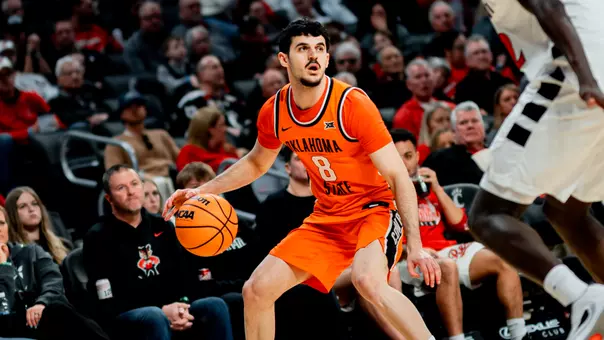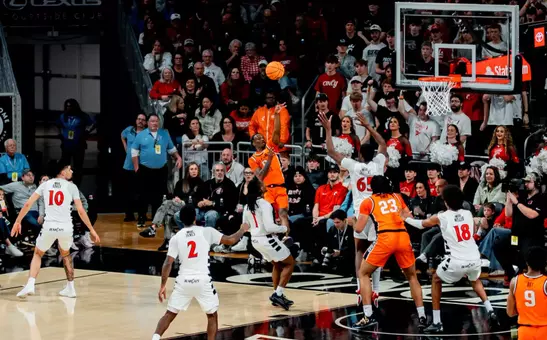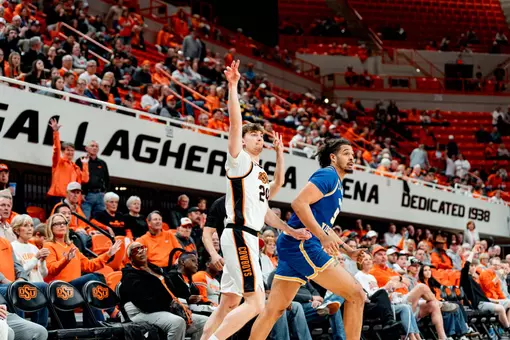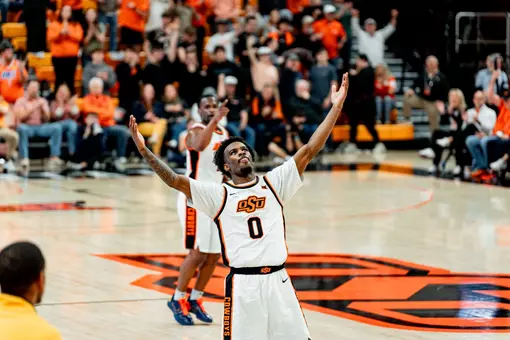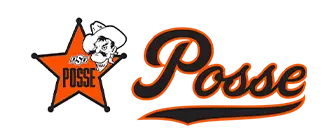Oklahoma State University Athletics
Soergel A Rare Three-Sport Star For Cowboys
September 15, 2010 | Cowboy Basketball
Sept. 15, 2010
Looking Back with Pat Quinn
Under the early athletic directorships of Ed Gallagher and Henry Iba, Oklahoma State modeled a successful and enviable intercollegiate athletic program.
It wasn't done with money because it was a scarce commodity for the fledgling Federal Land Grant College, and both Iba (basketball) and Gallagher (wrestling) were on board doing double-duty.
It wasn't uncommon to see varsity athletes doubling-up to letter in another sport. In fact, Bonnie Nicholson (1920-21- 22) recorded the rare triple-triple by lettering three years in football, basketball and baseball.
As the individual sports became more specialized, there were some double lettermen, but only once in the last 88 years has a Cowboy athlete earned three varsity monograms in football, basketball and baseball.
The credit goes to quarterback Dick Soergel, a 1956 graduate of Capitol Hill High School in Oklahoma City.
Soergel not only earned nine varsity letters (freshmen weren't eligible to play in those days), he played in five NCAA postseason events. In fact, he was the winning pitcher in OSU's 1959 national championship baseball game, when he shut down Arizona over the final 5 1/3 innings to take the NCAA baseball crown, 5-3.
In Soergel's three football seasons, the Cowboys were 20-10, winning the 1958 Blue Grass Bowl over Florida State, 15-6, on a day that never saw the thermometer warmer than seven degrees above zero.
That bowl victory, the first in 12 years for OSU, produced a pair of rare records for the Pokes.
First, both the Pokes and Seminoles had to play in tennis shoes because the turf was frozen so solidly the usual football cleats couldn't pierce the ground and provide traction.
Soergel laughingly recalls, "After we got to Louisville, Coach (Cliff) Speegle had to send somebody to town to buy tennis shoes for the team. It was the first and only time I ever had to play in tennis shoes."
Secondly, it was the first time in OSU history the Cowboys exercised the newly ruled two-point conversion. Soergel completed a short pass to Duane Wood to give OSU a 15-0 halftime advantage, and Florida State never had possession of the ball again with the opportunity to overtake OSU.
In Soergel's three seasons of basketball, the Cowboys went 49-31 and in 1958 advanced to the third round (Elite Eight) of the NCAA Tournament.
Soergel remembers one of the rare wins at Kansas, saying, "It was my senior year at Lawrence, and we were ahead midway in the second half and Mr. Iba put us in the delay-game.
"Kansas had assigned Wayne Hightower to cover me when we did that. He was 6-foot-8 and I was 6-2, and he got so tired his tongue was hanging out.
"Of course, that delay game of Mr. Iba's beat a lot of people."
In Soergel's three seasons for OSU baseball, the Pokes were an amazing 56-14, and en route to the cherished national title in '59, the Cowboys played only 32 games and won 27 of them.
In his three-year, three-sport tour at OSU, Soergel was on the winning team 125 times while losing only 55 contests. That's a three-season standard of nearly 70 percent, a span of success the Cowboys have yet to duplicate.
In 1994, Soergel was elected into the OSU Baseball Hall of Fame.
This unusual Soergel-type of success shouldn't have been a big surprise to fans in the state of Oklahoma.
At Capitol Hill High School, the Soergel-led team was the "mythical" state football champions in 1953 and '54, the `54 state title winners in basketball and in '56 Capitol Hill claimed the baseball crown.
He was selected as a high school cage All-American his senior year and played in the schoolboy All-American game in Murray, Ky. The slender Soergel (6-2 by 170) was recruited by OSU, OU and OCU before electing to attend college in Stillwater.
Soregel, who served 16 years as OSU's athletic business manager, admits, "I loved to play sports and remember the great number of friends, both at OSU and on teams we played, I've made."
There were no lasting professional sports history in Soergel's playing days, which failed to diminish his competitive spirit and his numerous physical attributes. But, he did pursue playing semi-pro baseball for several years and was a member of the Rapid Transit Dream Line team that won the 1964 National Semi-Pro Tournament, played in Wichita, Kan.
Pat Quinn worked in the Oklahoma State Sports Information Office for 26 years, including serving as the director from 1969-1984.


